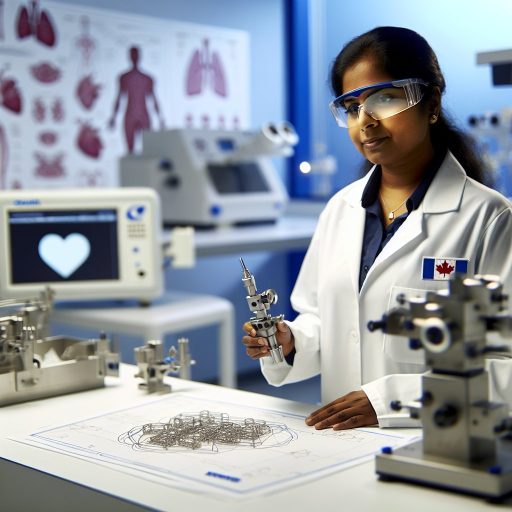Overview of Biomedical Engineering and its Scope
Definition of Biomedical Engineering
Biomedical engineering combines principles of engineering and medical sciences.
This field focuses on developing technologies and solutions for healthcare.
It integrates biological and physical sciences with engineering fundamentals.
Importance in Healthcare
Biomedical engineers play a crucial role in improving patient care.
They design medical devices, software, and systems that enhance diagnostics.
Additionally, their work contributes to the development of new treatments.
Areas of Application
The scope of biomedical engineering is broad and diverse.
It includes areas such as medical imaging and biomaterials.
Furthermore, it encompasses rehabilitation engineering and prosthetics design.
Emerging Technologies
Biotechnology and nanotechnology are advancing this field rapidly.
These technologies enable the creation of innovative medical devices.
Moreover, they facilitate targeted drug delivery systems for improved therapies.
Collaboration with Other Disciplines
Biomedical engineers often collaborate with healthcare professionals.
They work alongside doctors, researchers, and technologists.
This collaboration fosters a multidisciplinary approach to solving health challenges.
Educational Pathways for Biomedical Engineers
Overview of Educational Requirements
Biomedical engineers typically need a strong educational foundation.
A bachelor’s degree in biomedical engineering is essential.
Some universities may offer degrees in related fields.
A solid understanding of engineering principles is crucial.
Mathematics and science courses form the backbone of this education.
Undergraduate Programs
Most students enroll in a four-year undergraduate program.
These programs typically include coursework in biology and chemistry.
Engineering principles are also central to the curriculum.
Hands-on laboratory experience enhances learning.
Many programs offer internships for real-world exposure.
Unlock Your Career Potential
Visualize a clear path to success with our tailored Career Consulting service. Personalized insights in just 1-3 days.
Get StartedAdvanced Degrees
Some biomedical engineers pursue advanced degrees for specialization.
A master’s degree can provide a competitive edge in the field.
Programs often emphasize research and technical skills.
Doctoral degrees are also available for those interested in research.
PhD programs may focus on advanced topics in biomedical engineering.
Certification and Licensure
Biomedical engineers may seek certification for career advancement.
The Biomedical Engineering Certification Board offers credentials.
Licensure as a Professional Engineer might be necessary for some roles.
This often requires passing exams and gaining experience.
Continuing education is important to maintain certification.
Implications of Educational Pathways
The education of biomedical engineers often blends theory and practice.
Students develop skills that are applicable in various industries.
Specializations can lead to diverse career opportunities.
A blend of technical knowledge and hands-on experience is key.
As the industry evolves, so too will education requirements.
Bachelor’s Degree: Core Requirements and Recommended Majors
Essential Coursework
A bachelor’s degree in biomedical engineering requires a strong foundation in mathematics.
Courses in calculus and differential equations are mandatory.
Students also need to study physics and chemistry extensively.
Understanding biological sciences is crucial for success in this field.
Additional coursework often includes materials science and thermodynamics.
These subjects provide essential knowledge for biomedical applications.
Recommended Majors
Prospective biomedical engineers should consider majoring in biomedical engineering.
Other relevant fields include mechanical engineering and electrical engineering.
Students may also choose majors in industrial engineering or materials science.
Some opt for biotechnology as a viable alternative.
These disciplines equip students with necessary interdisciplinary skills.
Hands-On Experience
Most programs emphasize the importance of laboratory work.
Internships provide invaluable real-world experience.
Many universities offer cooperative education options to integrate studies and work.
Engaging in research projects enhances practical skills significantly.
Students should seek opportunities that align with their career goals.
Accreditation and Certification
It is essential to attend an accredited engineering program.
Accreditation ensures the program meets high educational standards.
Graduates can pursue certification as an Engineer in Training.
This designation can advance career prospects in biomedical engineering.
Certification requirements vary by state, so research thoroughly.
Delve into the Subject: Tips for New Graduates in Chemical Engineering
Importance of Internships and Practical Experience in Biomedical Engineering
Real-World Skills Development
Internships provide invaluable hands-on experience in biomedical engineering.
Engaging in real-world projects enhances theoretical knowledge.
Students gain skills that are not typically taught in classroom settings.
These experiences prepare students for industry challenges.
Networking Opportunities
Internships allow students to connect with professionals in the field.
Building relationships can lead to future job opportunities.
Networking within companies can provide mentorship and guidance.
Such connections can prove beneficial throughout one’s career.
Resume Enhancement
Having practical experience enhances a resume significantly.
Potential employers value candidates with proven experience.
Internships showcase a commitment to the field of biomedical engineering.
They also highlight relevant skills that are attractive to employers.
Understanding Industry Standards
Internships immerse students in industry practices and standards.
Understanding compliance and regulations is crucial in this field.
Moreover, firsthand experience with technologies and tools is vital.
This knowledge prepares students for future professional roles.
Find Out More: Tips for Chemical Engineers Navigating Job Markets
Advanced Degrees: Master’s and PhD Programs in Biomedical Engineering
Introduction to Advanced Degrees
Biomedical engineering is a rapidly evolving field.
Advanced degrees significantly enhance career prospects.
A Master’s or PhD can open doors to more opportunities.
Master’s Degree Programs
A Master’s degree typically requires two years of study.
Students gain specialized knowledge in various areas.
Common areas of focus include tissue engineering and medical imaging.
Programs often include both coursework and research components.
Many institutions also offer online options for flexibility.
Core Curriculum
The core curriculum usually covers essential topics.
Students explore biomechanics, biomaterials, and instrumentation.
These subjects lay the foundation for advanced studies.
Research Opportunities
Research is a critical component of Master’s programs.
Students often work on cutting-edge projects.
This experience builds skills necessary for future roles.
Collaboration with faculty can enhance learning outcomes.
PhD Programs
A PhD typically takes four to six years to complete.
This degree focuses heavily on original research.
PhD candidates contribute to advancements in the field.
They often publish findings in academic journals.
Comprehensive Exams and Dissertation
Most PhD programs require passing comprehensive exams.
These exams assess knowledge in core biomedical engineering areas.
Following this, students must propose and complete a dissertation.
The dissertation represents significant research contributions.
Career Pathways for PhD Graduates
PhD holders often pursue academic positions.
They may also enter industrial research roles.
Some work in government agencies focusing on health regulations.
Their expertise is invaluable in leading research initiatives.
Benefits of Advanced Degrees in Biomedical Engineering
Advanced degrees in biomedical engineering offer numerous benefits.
They equip students with the expertise needed in diverse career paths.
Both Master’s and PhD programs prepare graduates for significant contributions.
Find Out More: Chemical Engineers’ Contributions to the Food Industry

Certification and Licensing Requirements for Biomedical Engineers
Understanding Certification
Certification enhances a biomedical engineer’s credibility in the job market.
Obtaining certification often involves passing an exam that tests specific knowledge and skills.
The most recognized certification is offered by the National Society of Professional Engineers.
Other organizations, like the American Board of Engineering and Technology, also provide valuable certifications.
Licensing Necessities
Most states require biomedical engineers to be licensed to practice independently.
The process typically starts with earning a relevant bachelor’s degree in engineering.
After that, gaining practical experience under a licensed engineer is essential.
Finally, candidates must pass the Fundamentals of Engineering (FE) exam.
Once they pass the FE, they can work towards the Professional Engineer (PE) license.
Experience Requirements
A minimum of four years of work experience is often required for PE licensure.
This experience should be gained in a relevant field under the supervision of a licensed engineer.
Exposure to real-world projects enhances the learning experience for aspiring engineers.
Continuing Education
Most states mandate continuing education for license renewal.
Engineers must stay updated with the latest advancements in technology and practices.
This requirement ensures they maintain their professional competence throughout their careers.
Many organizations offer workshops, seminars, and courses for continuing education credit.
Importance of Professional Associations
Joining professional associations can provide valuable networking opportunities.
Associations like the Biomedical Engineering Society offer resources for professional development.
Participation in these organizations can facilitate access to certifications and conferences.
Explore Further: Advancing Your Career in Chemical Engineering
Continuing Education and Professional Development Opportunities
Importance of Lifelong Learning
Biomedical engineers must embrace lifelong learning to stay relevant.
Advancements in technology can change the landscape rapidly.
Continuing education enhances skills and knowledge in the field.
Moreover, it helps professionals meet licensing and certification requirements.
Certification Programs
Various certification programs support career advancement.
One such program is offered by the Biomedical Engineering Society.
The Certified Biomedical Equipment Technician (CBET) credential is popular.
Additionally, the Clinical Engineer Certification offers a broader scope.
These certifications validate expertise in the field.
Online Learning Platforms
Online platforms offer convenient learning opportunities.
For instance, Coursera provides courses from top universities.
edX also features programs in biomedical engineering and related fields.
These platforms allow flexible learning schedules.
Furthermore, they accommodate various learning paces.
Workshops and Seminars
Workshops and seminars provide hands-on learning experiences.
Many industry organizations host regular events for professionals.
For example, the American Institute for Medical and Biological Engineering organizes annual meetings.
These events foster networking and knowledge exchange.
Moreover, they offer insights into current trends and innovations.
Graduate Programs and Specializations
Pursuing a graduate degree can enhance career opportunities.
Several universities offer specialized programs in biomedical engineering.
These programs often focus on areas like medical imaging and robotics.
Students gain in-depth knowledge and research experience.
Ultimately, advanced degrees can lead to higher-level positions.
Professional Organizations
Joining professional organizations provides valuable resources.
Membership often includes access to publications and research journals.
Organizations like the Institute of Electrical and Electronics Engineers offer numerous benefits.
Networking opportunities can lead to potential job offers.
Additionally, organizations frequently host educational events.
Networking and Mentoring
Networking is crucial in the biomedical engineering field.
Connecting with industry peers opens doors for collaboration.
Moreover, mentoring relationships can provide guidance and support.
Mentors can offer advice on educational and career paths.
These connections can significantly impact career growth.
Skills and Competencies Required for Success in Biomedical Engineering
Technical Proficiency
Biomedical engineers need strong technical skills to succeed.
They must understand complex biological systems and engineering principles.
Additionally, proficiency in software tools is critical for design work.
Knowledge of programming languages enhances their ability to create simulations.
Analytical Thinking
Analytical thinking is essential in biomedical engineering.
Engineers must evaluate data effectively to solve problems.
They should interpret research findings to inform their projects.
Moreover, the ability to think critically leads to better design choices.
Communication Skills
Communication skills play a vital role in this field.
Biomedical engineers must convey complex ideas clearly to diverse audiences.
Effective collaboration with healthcare professionals enhances project outcomes.
Writing technical reports and presentations is also crucial for sharing findings.
Creativity and Innovation
Creativity fuels innovation in biomedical engineering.
Engineers should develop new solutions to address healthcare challenges.
Thinking outside the box can lead to groundbreaking medical devices.
Furthermore, a creative mindset supports continual improvement in designs.
Teamwork and Collaboration
Successful biomedical engineers excel in teamwork and collaboration.
They often work with multidisciplinary teams in diverse settings.
Collaboration enhances project efficiency and promotes knowledge sharing.
Respect for each team member’s expertise fosters a positive work environment.
Additional Resources
Bioengineering vs. Biomedical Engineering: What’s the Difference …




